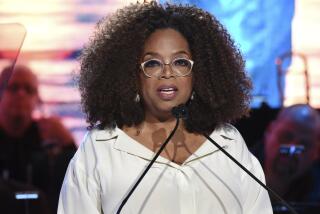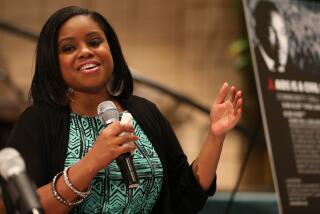Tennis Great Ashe Reveals He Has AIDS
- Share via
NEW YORK — Tennis great Arthur Ashe, who used his center court success to fight for equality both in the United States and South Africa, announced Wednesday that he has known since 1988 that he has AIDS.
Ashe, the first black man to win at Wimbledon, said he was certain that he got the virus during one of his two heart bypass operations before 1985, when testing began to screen blood for the AIDS virus.
“We are 100% sure the cause of my HIV infection was a blood transfusion either after my 1979 bypass operation or the ’83 operation,” Ashe told a packed news conference as more than 30 television cameras focused on him. “We are 95% sure it was the ’83 operation.”
Ashe said he learned that he had AIDS when he was admitted to New York Hospital for brain surgery in September, 1988, after his right hand became paralyzed. When surgeons operated they found toxoplasmosis, a protozoan parasite that can attack patients whose immunity is weakened by AIDS.
Ashe, who was ranked first in the tennis world in 1968 and 1975, said with some bitterness that he was making his disclosure only because the newspaper USA Today had called him last week and revealed that it was working on a story saying he had AIDS.
“Somebody just called (the newspaper) and ratted on me,” Ashe said, “and so they felt journalistically they had to follow up, and I was the victim. I just didn’t want to go public now because I am not sick.”
Later, as the news conference drew to a close, the 48-year-old Ashe said he had experienced some AIDS symptoms, but he stressed that they did not really interfere with his life and boasted that he still can play 36 holes of golf without a golf cart.
“I have good days and bad days,” Ashe said while his good friend and occasional tennis partner New York Mayor David N. Dinkins stood nearby. “My ratio of good days to bad days is about 6 to 1. I don’t think anybody in my stage of this would be able to go through with no bad days. That just happens.”
Ashe said that if it weren’t for the person who called USA Today “and ratted on me . . . you would not be at this press conference and I still would be living a relatively normal life.
“I don’t like doing this under duress. I feel angry,” Ashe added.
In a prepared statement Ashe read before taking questions, he said he decided not to reveal in 1988 that he had AIDS because “any admission of HIV infection at that time would have seriously, permanently and--my wife and I believed--unnecessarily infringed upon my family’s right to privacy.
“Just as I am sure everyone in this room has some personal matter he or she would like to keep private, so did we,” Ashe said, adding that his wife and 5-year-old daughter “are in excellent health and both are HIV negative.”
When Ashe came to the portion of the statement where he began to speak of the challenge of telling his daughter he has the disease, he was momentarily overcome by emotion and could not continue. His wife, Jeanne, walked to the lectern and read a poignant paragraph.
“Even though we’ve begun preparing Camera for this news, beginning tonight, Jeanne and I must teach her how to react to new, different and sometimes cruel comments that have little to do with her reality,” she read.
Ashe said in his statement that, particularly for the sake of his family, he and his wife and some close friends had talked about how long they could conceal the fact he had AIDS.
He said he had not yet spoken with former Los Angeles Lakers basketball star Earvin (Magic) Johnson, who announced in November that he was carrying the AIDS virus. Unlike Ashe, Johnson has not developed the disease itself.
Ashe, who scored his greatest triumph when he defeated Jimmy Connors in 1975 to capture the Wimbledon crown, drew a distinction between the timing of his and Johnson’s announcements.
“Magic’s situation was a little different than mine,” Ashe said. “He was put in an even less enviable position because there was no other way to explain a very quick and hasty retirement from the Lakers except to go public with that. I was not in that situation. Magic is obviously an active athlete and he is much more in the public eye than I am on a day-to-day basis. But I have tremendous admiration for the way he handled the press conference.”
Ashe said he videotaped the news conference when Johnson revealed that he was HIV positive.
Johnson, in a statement, extended support and prayers to the tennis player and his family.
“It takes great courage and strength to make such an announcement,” Johnson said. “I am sure Arthur will meet this challenge head on and become a leading voice in the fight to educate, raise funds and increase awareness to all, especially our youth.”
Ashe said he had spoken with President Bush, a friend for 25 years, on Wednesday and expected at some stage to assist the President’s commission on AIDS.
Ashe also said he would work with Dinkins to increase AIDS awareness in New York City.
“Because of my passion for tennis, Arthur has not only been a good friend, but he has also been my role model both on and off the court,” Dinkins said. “This news is devastating to me and all of his friends and fans who love him.”
Gene Polichinski, the sports managing editor of USA Today, confirmed his newspaper’s role in Ashe’s decision and said that Doug Smith, the tennis reporter who asked Ashe Tuesday whether he had AIDS, had known Ashe since they played tennis in high school in Richmond, Va.
“At that time he would neither confirm nor deny,” Polichinski said. “His first reaction was ‘Can you prove it?’ ”
Polichinski then interviewed Ashe himself and told him that “if he did not confirm or deny, we would continue to pursue the story to confirm it from other sources. But I said we were not going to back into the story by writing ‘Arthur Ashe today denied rumors that he had AIDS,’ and that we did not run unconfirmed rumors.”
Polichinski said Ashe also asked for 36 hours to set up a press conference to make an announcement. The editor said he declined that offer, saying that “as a journalist I could not get into those kind of arrangements.”
Polichinski said that USA Today considers the health of public figures to be news and that it never entertained the possibility that it would not publish the story if it were confirmed.
“When a major public figure has an illness that we reasonably believe will be fatal or is injured in a serious way, it is news,” Polichinski said. “We have all learned what AIDS is, and I think there was no question when Magic Johnson disclosed that he was HIV positive that it was news. . . . Mr. Ashe’s life affects a great many people. So there is no question in my mind that is legitimately news, and I think we went about pursuing it in a responsible fashion.”
Ashe said that when USA Today confronted him with the rumor, “It put me in the unenviable position of having to lie if I wanted to protect my privacy. No one should have to make that choice. I am sorry that I have been forced to make that revelation now.
“After all,” Ashe continued, “I am not running for some office of public trust, nor do I have stockholders to account to. It is only that I fall under the dubious umbrella of public figure.
Ashe underwent quadruple bypass surgery at St. Luke’s Hospital in New York City on Dec. 13, 1979, after suffering a heart attack that July. Surgeons again performed a bypass in June, 1983, at the same hospital. At that time it was not yet possible to test blood for the presence of the AIDS virus.
Dr. John E. Hutchinson, the director of cardiac surgery at St. Luke’s at the time, said he planned to check whether Ashe received transfusions.
“It is possible he received the blood product,” Hutchinson, now director of cardiac surgery at Hackensack Medical Center in New Jersey, told the Associated Press. “There are many other ways to acquire this other than cardiac surgery.”
Ashe first gained tennis prominence in 1961 when he won the National Interscholastic Tennis Championship as a high school player in Richmond. He retired from tennis after his 1979 operation.
His victory at Wimbledon followed triumphs by Althea Gibson, who became the first black woman to win the English tournament in 1957 and 1958.
During his career and afterward, Ashe used his athletic status as a springboard for activism. He worked successfully to have South Africa banned from the Davis Cup in 1970 because of apartheid. Within the United States, he stressed that black athletes should promote civil rights and addressed the United Nations Commission on Human Rights.
Ashe was asked Wednesday if he had any message for people with AIDS.
“I would say, first, take care of yourself,” Ashe advised. “You never know what breakthroughs are around the corner.”
Times staff writer Thomas B. Rosenstiel in Washington contributed to this story.
RELATED STORY: C1
More to Read
Go beyond the scoreboard
Get the latest on L.A.'s teams in the daily Sports Report newsletter.
You may occasionally receive promotional content from the Los Angeles Times.










